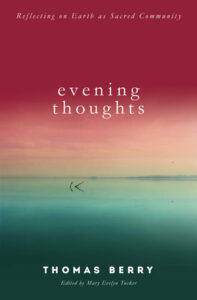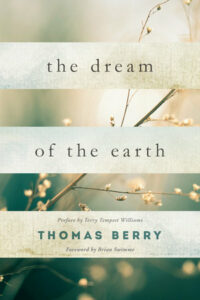Thomas Berry
Thomas Berry (1914–2009), one of the leading environmental thinkers in North America, was the director of the Riverdale Center for Religious Research and founder of the History of Religions Program at Fordham University. His other major publications include Evening Thoughts (2006), The Universe Story with Brian Swimme (1992), and The Great Work (1999).
Subscribe to our newsletter for news & events from Counterpoint Press.
Books
Evening Thoughts
Reflecting on Earth as a Sacred Community
Essays on our spiritual role in the fate of the planet from “the most provocative figure among the new breed of eco–theologians” (Newsweek).Among the contemporary voices for the Earth, none resonates like that of cultural historian Thomas Berry. His teaching and writings have inspired a generation’s thinking about humankind’s place in the Earth community and the universe, engendering widespread critical acclaim and a documentary film on his life and work.
This new collection of essays, from various years and occasions, expands and deepens ideas articulated in his earlier writings and also breaks new ground. Berry opens our eyes to the full dimensions of the ecological crisis, framing it as a crisis of spiritual vision. Applying his formidable erudition in cultural history, science, and comparative religions, he forges a compelling narrative of creation and communion that reconciles modern evolutionary thinking and traditional religious insights concerning our integral role in Earth’s society.
While sounding an urgent alarm at our current dilemma, Berry inspires us to reclaim our role as the consciousness of the universe and thereby begin to create a true partnership with the Earth community. With Evening Thoughts, this wise elder has lit another beacon to lead us home.
“Thomas Berry is an exemplar in a tradition that includes a diverse group of spiritually radiant individuals (Gandhi, the monk Thomas Merton, the Lakota elder Black Elk), visionaries (Jacques Ellul, Terry Tempest Williams, Rachel Carson), and writers (Wendell Berry, Gary Snyder, Rebecca Solnit, Loren Eiseley).” —Barry Lopez, author of Arctic Dreams
The Dream of the Earth
This landmark work, first published by Sierra Club Books in 1988, has established itself as a foundational volume in the ecological canon. In it, noted cultural historian Thomas Berry provides nothing less than a new intellectual–ethical framework for the human community by positing planetary well–being as the measure of all human activity.Drawing on the wisdom of Western philosophy, Asian thought, and Native American traditions, as well as contemporary physics and evolutionary biology, Berry offers a new perspective that recasts our understanding of science, technology, politics, religion, ecology, and education. He shows us why it is important for us to respond to the Earth's need for planetary renewal, and what we must do to break free of the "technological trance" that drives a misguided dream of progress. Only then, he suggests, can we foster mutually enhancing human–Earth relationships that can heal our traumatized global biosystem.

Catapult | Counterpoint | Soft Skull
20 Jay Street #704
Brooklyn, NY 11201
646.926.0805 | contact@catapult.co






